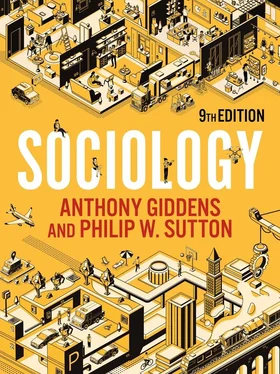Working out the causal connections involved in identified correlations is often difficult. For instance, there is a strong correlation in modern societies between level of educational achievement and occupational success. The better the grades an individual gets in school, the better paid the job they are likely to get when they leave. What explains this correlation? Research tends to show that it is not formal schooling in itself; levels of educational attainment are influenced much more by the type of home from which the person comes. Children from better-off homes, whose parents take a strong interest in their learning, where books are abundant and a place to study exists, are more likely to do well than those from lowerincome groups where these aspects may not be available. The causal mechanisms here are the facilities that parents are able to provide for their children to study.
Causal connections in sociology should not be understood in too mechanical a way. The attitudes people have and their subjective reasons for acting as they do are causal factors in relationships between variables in social life, and qualitative research is required if we are to gain the kind of in-depth understanding of how individuals interpret their world. Max Weber (1979 [1925]: 13) was clear that sociological work should be explicable at this individual and interactional level, which is where the meaningfulness of social life is produced.

A discussion of some recent ‘critical realist’ approaches which focus on establishing causal mechanisms in social life can be found in chapter 5, ‘The Environment’.
In quantitative research, assessing the cause or causes that explain a correlation usually involves distinguishing independent from dependent variables. An independent variable is one that produces an effect on another variable. The variable affected is called the dependent variable. In the example above, academic achievement is the independent variable and occupational income the dependent variable. The distinction refers to the direction of the causal relation. However, the same factor may be an independent variable in one study and a dependent variable in another. It depends on what causal processes are being analysed. If we were looking at the effects of differences in occupational income on people’s lifestyles, then occupational income would be the independent rather than the dependent variable.
To find out whether a correlation between variables is a causal connection, we can use controls, which means we hold some variables constant in order to look at the effects of others. By doing this, we are able to judge between explanations of observed correlations, separating causal from non-causal relationships. For example, medical researchers studying smoking behaviour may suggest that vaping via e-cigarettes leads to a reduction in conventional tobacco smoking in young adults aged eighteen to twenty-four – that there is a causal connection between e-cigarette use and smoking cessation. To find out, we could gather a sample of conventional smokers in this age group and assign them randomly into two groups: an experimental group that is given e-cigarettes and a control group that is not. After the study period, we would measure tobacco-smoking activity in the two groups; if the experimental group smokes less than the control group after their experience with e-cigarettes, we may attribute the reduction to the latter.

This is a simplified example to illustrate the principle of using control groups in variable analysis, but in reality things can be more messy and complex than is suggested here. Was it really vaping that caused the reduction in tobacco smoking? Could it be that, during the research process, positive praise for trying to stop smoking received from friends and family was the strongest factor?
An example of how difficult it can be to establish causal relations involved in a correlation is given by the long history of studies of smoking and lung cancer. Research has consistently demonstrated a strong correlation between these two. Smokers are more likely to contract lung cancer than non-smokers, and very heavy smokers are more likely to do so than light smokers. The correlation can also be expressed the other way around. A high proportion of those who have lung cancer are smokers or have smoked for long periods in the past. There have been so many studies confirming these correlations that today it is generally accepted that a causal link is involved, but the exact causal mechanism is thus far largely unknown.

Researchers may want to know why some young Muslims in the UK wear headscarves while others do not. However, it can be difficult to establish a causal relationship between the various factors involved.
However much correlational work is done on any issue, there always remains some doubt about the possible causal relationship. Other interpretations of the correlation are at least theoretically possible. It has been proposed, for instance, that people who are predisposed to lung cancer are also predisposed to smoke. On this view, what causes lung cancer is not smoking per se but, rather, some in-built biological disposition to both smoking and cancer. Identifying causal relationships is normally guided by previous research into the subject at hand. If we do not have some reasonable idea beforehand of the causal mechanisms involved in a correlation, we would probably find it very difficult to discover what the real causal connections are. In short, we would not know what to test for .
Sociological research methods
A common distinction is often made in sociology between quantitative and qualitative research methods and traditions. The former are associated with functionalism and positivism, the latter with interactionism and the search for meanings and understanding. As the term suggests, quantitative methods try to measure social phenomena and will use mathematical models and, often, statistical analysis to explain them. Qualitative methods attempt to gather detailed, rich data, allowing for an in-depth understanding of individual actions within the context of social life. As a rough-and-ready guide to a diverse range of sociological research methods, this distinction is a useful starting point. Many sociologists do tend to specialize or even favour one tradition over the other. However, there is a danger that the two traditions will be seen as opposing ‘camps’ with entirely different approaches to research. This would not be very productive, nor does it adequately describe the situation that exists.
In fact, many research projects use mixed methods – both quantitative and qualitative – in order to gain a more comprehensive and rounded understanding of the subject being studied. The findings from separate quantitative and qualitative studies can also be combined. For example, some feminist sociologists favour qualitative methods, which, they argue, allow the authentic voices of women to be heard in ways that quantitative studies just cannot match. This latter point is undoubtedly correct. But without quantitative studies it would not have been possible to measure the full extent of gender inequality in society or to set those individual women’s voices into a wider societal context. Sociologists have to be prepared to use the most appropriate methods for the specific questions they want to answer.
Читать дальше















